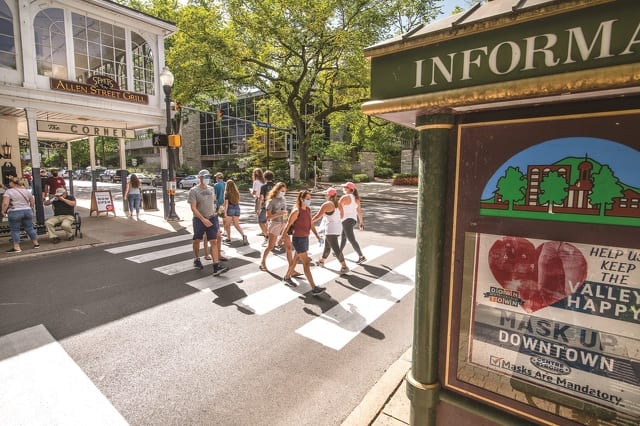Off-campus backyards brimming with students and large clusters of friends making their way downtown are sights that will be missing this year, if things go according to plan, as Penn State students settle back into Happy Valley.
With the uncertainty and ever-changing regulations surrounding the return of students to college campuses across the United States, Penn State’s plan to host in-person classes will have drastic implications on the student experience.
Imane Guissé, a second-year graduate student at the School of International Affairs, enjoyed a quiet summer in State College as she awaited her classes to set in motion this fall.
“Summer was nice and empty here; I was able to go downtown with a mask and sanitizer and go shopping, but I don’t really think that’s going to be an option for me this fall,” she says.
Guissé feels that Penn State is doing an exceptional job, given the circumstances in bringing more than 40,000 students from all over the country back into one small town. However, she is worried about the disconnect between safety measures such as mandated masks and sanitizing stations on campus, and the lack of distancing that might occur off campus.
Guissé says she will be taking all guidelines seriously as she navigates her new normal while she continues her studies in Middle Eastern intelligence.
“I’m a naturally social person, so it’s going to be difficult for me to return, no matter how comfortable I feel, because I’m always going to miss and crave those interactions,” says Guissé.
This fall will provide hurdles to many organizations, including clubs and sororities and fraternities, which typically center on large gatherings of people.
Senior Madison Yeoman is chapter president of Kappa Delta, one of the 20 sororities associated with Penn State. Yeoman is actively working with Panhellenic, the governing board of sorority life, to ensure all members are aware of the rules this fall.
“Chapters and events are all virtual … this is difficult because it will be hard to keep girls engaged, but I’m going to try to do as many virtual events as possible,” she says.
Gatherings between sorority and fraternity communities are supposed to be nonexistent. Collectively, the university and town have banned all large get-togethers, with fines up to $300 for each student in violation of the regulations.
While Yeoman expects all chapters will be clear when laying out the rules to their members at the start of the semester, she sees the challenges that could arise.
“I think this is going to be hard for all students – not just students who are parts of larger organizations – to safely distance from their friends that they haven’t seen in six months, especially given the circumstances of how the spring semester ended this year,” she says.
Student government – the University Park Undergraduate Association – was actively listening to students and assessing the dynamic COVID-19 situation for both on- and off-campus students as the start of the school year approached.
Senior Zachary McKay, president of UPUA, explains the challenge that the university and most likely UPUA will face as the semester progresses.
“Ultimately, there is very little that the university can do with the off-campus breaches [of conduct], but on campus it is a different story. … The crux of the problem is seeing where the university has the authority to step off campus, as well as finding overlap with local jurisdiction,” he says.
While currently no member of UPUA sits on the university’s COVID-19 task force, the UPUA has been a part of reviewing and clarifying messaging surrounding new protocols that come from university officials and are distributed to students.
McKay stresses the importance of students getting to know their representatives to bring about change.
“Student representation matters,” he says, adding that students “need to know their representatives; that process becomes the official position of the student body.”
Most, if not all, of UPUA’s events will now be virtual, and it gives students the opportunity to sit in on meetings without the pressure of showing up to a room of strangers. UPUA will be livestreaming all of its meetings, a new practice that is intended to continue long after distancing restrictions are lifted.
Looking forward, McKay sees lasting changes arising from adjustments made during quarantine.
“The student experience is going to be totally shifted online, and we need to start planning ahead for when this virtual-only atmosphere reverts back to that in-person experience and acknowledge that some things will never be the same,” he says.
Elizabeth Molek, a 2020 Penn State graduate, is a freelance writer.



